Anticipation buzzes across the blacked-out stage. In the wings, we ready ourselves. After a hundred hours of rehearsal, this moment comes at us at warp speed. Lights up, music on, action!
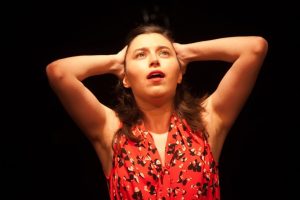
Didem Uca in LOVE in contact, July 14 and 15 at Theaterhaus Berlin Mitte
LOVE in Contact was a theater project devised by a team of thirteen individuals from different national, cultural, and linguistic backgrounds, the culmination of six months of exploring love in all its facets. As both a researcher of contemporary migrant, multilingual, and transnational cultures in Germany and a lifelong thespian, I could feel my scholarly and creative sides coming together in ways I could not have imagined when I first began my Research Fellowship at Humboldt University of Berlin’s Institute for German Literature exactly ten months prior.
In my dissertation, I analyzed 20th and 21st century German-language novels and memoirs about young migrants and refugees. While my ‘day job’ took place in lecture halls and libraries, in the evenings, I explored the city’s rich cultural offerings, including attending performances of both traditional repertoire and avant-garde productions at theaters such as the Maxim Gorki and Ballhaus Naunynstraße, which produce plays by and for communities from migrant and refugee backgrounds. I also participated in Youngcaritas Kulturbuddys, a group that brings together 18-27-year-old refugees and non-refugees for cultural excursions. When the leaders of that group invited me to participate in a new theater project, I jumped at the chance to transition from scholar and audience member to creative writer and actor.
Collaborating with the cast and crew felt like putting theory into practice; it gave me first-hand experience of the kinds of transcultural labor performed by the writers and protagonists I examine in my research, simultaneously enriching my understanding of transnational, multilingual art forms and my own self-understanding as a Turkish-American PhD Candidate in German studies. Writing and performing in this production and even helping to create the sets has invigorated my desire to become an active participant in contemporary German culture rather than a mere observer. I also feel encouraged to incorporate the arts in my teaching, scholarship, and activist work so that students and members of the community may feel inspired to make German culture their own.
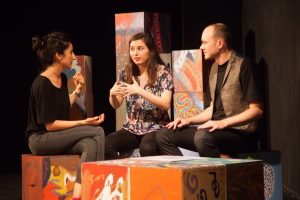
Left to right: Ebru Duman, Didem Uca, and Frederik Bechtel in LOVE in contact, July 14 and 15 at Theaterhaus Berlin Mitte
My advice for Fulbrighters about to begin their journeys and for prospective applicants envisioning their grants is to seek out opportunities for community engagement and creative practice, as these are just as vital a part of your role as cultural ambassador as your research and teaching. You can learn about opportunities for engagement by following cultural organizations on social media, scouring your host university’s bulletin boards, reading the arts and culture sections of local newspapers, and even Googling, which is how I found out about Kulturbuddys.
Senator J. William Fulbright defined the “essence of intercultural education” as the “acquisition of empathy––the ability to see the world as others see it, and to allow for the possibility that others may see something we have failed to see, or may see it more accurately.” Theater, like all forms of creative expression, can bring people into contact with new perspectives that challenge their own prejudices, hopefully leading, as Senator Fulbright had hoped, to a more empathetic world. So, how will you spend your time off the clock?
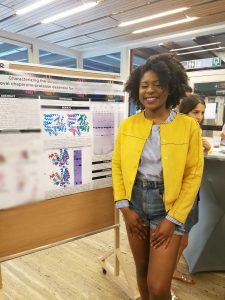
Presenting a poster for Ph.D. Day at the de Duve Institute.
I had no idea what to expect from Brussels as I prepared to make the de Duve Institute my new lab home for the year. As a black woman and first-generation Nigerian-American, I did not know if I would see myself represented in professional or social settings in Europe. What I did know was that I would be in a supportive lab environment working with the best microbiologists in the world to combat the global threat of antibiotic resistance.
In hindsight, Belgium was the perfect fit for me academically, professionally, and socially. I established relationships with European research institutions, further prepared myself for my Ph.D. Program in the Biomedical Sciences at the University of Michigan through my research project, and made friends across the world.
One of the most rewarding experiences I had as a scientist was at our lab retreat in Cadiz, Spain, where several labs across Europe met to present our research. During a career panel discussion, I looked around the room and saw 40+ scientists but no people of color. I raised my hand and asked, “Where are the women and people of color in leadership positions? The majority of people at this retreat are women, yet all of the people in charge of these labs are white men.“
Although extremely nervous, I felt obligated to be a voice for underrepresented (UR) minorities. As the only black voice, the only American voice, I could not allow the fear of asking a controversial question overshadow the opportunity to spark cross-cultural dialogue about the need for diversity in the sciences.
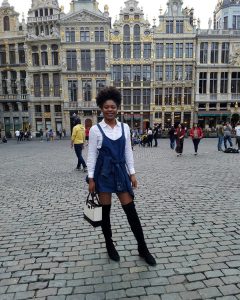
Spending the day at Grand Place with friends visiting from the U.S.
There was a pause followed by empathetic sighs and laughter. It was clear that they understood the gravity of my question and the paradox of discussing the need for diversity with a non-diverse panel. One of the panelists, the head of a major research institute in France, stated that they were deeply committed to diversifying STEM fields and had created task forces to increase the number of women in leadership positions. The other panelists echoed similar sentiments which prompted a passionate discussion about gender discrimination and implicit biases in STEM. Some made the point that increasing paternity leave would discourage employers from assuming that women would need more time off from their jobs than men. Others shared feelings of discouragement from seeing a room filled with female scientists only to see leadership roles filled by men. After the panel discussion, a few women expressed their gratitude for my question and I felt extremely proud for having the courage to embody the heart of the Fulbright Program.
Although my question was well-received, as the panelists and audience focused on gender, my point about race was lost. I was not surprised that this happened. Being the only person of color in the room, I recognized that people tend to focus on issues that they identify with. This further highlights the need for representation in these spaces so that UR groups will be supported and their needs addressed. Regardless, I am happy that I brought the issue to people’s attention. I hope that they will be sensitive to the challenges with representation of people of color in STEM moving forward.
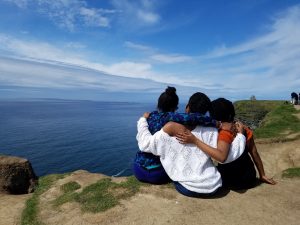
Day trip to the Cliffs of Moher, Ireland with Fulbright grantees.
Related to my passion for advocating for UR groups, I created the @fulbrightnoir Instagram account to share the stories of black Fulbrighters. After meeting the first black Fulbrighters that I knew through Instagram, I wanted to encourage prospective UR applicants and UR groups within Fulbright by showcasing the diversity that exists within the program.
In addition to the @fulbrightnoir community, I connected with a Belgian woman through Instagram who introduced me to Matonge, an area central to the Congolese community in Belgium. This was the first time I was surrounded by people that looked like me and I felt right at home.
My advice to future Fulbrighters is to be open to meeting people through various platforms. Be creative, committed, and unyielding while creating your new home abroad. Social media was instrumental in building my social networks and finding social scenes that I missed direly in the U.S. Instagram connected me with a new side of Brussels that transformed my experience from great to perfect.
Sometimes we need to move across the ocean for that huge, transformative experience. Imagine a teacher of English winning the Fulbright scholarship and getting to come to the country where English is spoken not only by its citizens but also by thousands of other international students pursuing their dreams! It’s a great feeling of happiness, joy, delight and so much more when you are given a platform to live your dream!
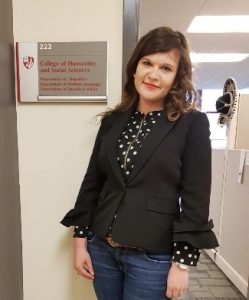
Olga Litvinova at the Linguistics Department of Montclair State University, New Jersey, her host institution
That was just the way I was feeling about the opportunity to do research at the Linguistics Department of Montclair State University, New Jersey. I have been lucky to investigate the binding power of English as an international language first-hand. My research involved collecting texts and interviews from non-native speakers of English to discover how their personality impacts the way they use this language and how their identities are transformed in the process.
Thanks to the Fulbright Program and a number of networking events, I could take advantage of connecting with people from around the world and hearing their stories. Over these ten months I have found myself experiencing different locations on the world map, including some places I didn’t know existed. I not only expanded my network through extensive geography and culture classes, but more importantly, I met with American and international students who do things that make life worth living. We would get together to talk, to laugh, to share – our lives, our stories, our worries. I also learned about the bonds created through food as I went out for meals with fellow Fulbrighters.
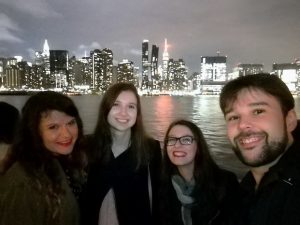
Olga (left) enjoying a Manhattan cruise with fellow Fulbrighters
Another beautiful thing that is even better when done in a group is traveling. With my new friends I would have never met if it wasn’t for the Fulbright, I got to explore the crazy world of New York City – a perfect playground for a linguist that made me want to try to learn even more languages to understand more of the enchanting polyphony of its streets. It was equally wonderful to go beyond NYC and get a taste of the unique beauty and character of other parts of the United States. Never at any point during my academic, social and personal journey have I felt like a foreigner because of the Americans, and the entire international crowd, who supported me during my Fulbright and gave me something to miss when I return home.
I am still working on answering my research questions, but I can conclude that the effect a Fulbright experience has on our personality and identity is beyond words. I know we will all return to our homes different people – more humble and educated about this world and feeling so much smaller and more connected thanks to all the beautiful people each of us has had the honor of meeting along the way.
Read more about Olga’s Fulbright research project, and her Fulbright experience.
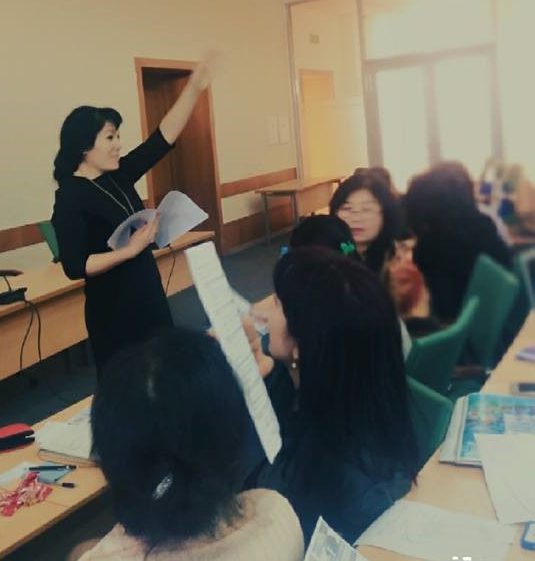
Durdona Karimova, 2014-2015, Fulbright FLTA from Uzbekistan, hosts a workshop on innovative language teaching techniques at Tashkent State University of Law, Uzbekistan
Education runs in my family. My grandfather was a school principal, my grandmother was a recognized and awarded teacher, and my mother is a language teacher, whose ability to win the interest of bored students fascinated me as a child.
While the tendency to value sons more than daughters was common for some parents in Uzbekistan, my father valued and fostered equal educational opportunities for my siblings and me. I took full advantage of this familial support, earning a Bachelor of Arts in English and German Philology with Honors, and a Master of Arts in English Linguistics from the Uzbek State World Languages University.
When I began teaching, I introduced using puppets to a gender-imbalanced group of students who were difficult to work with. Puppets turned out to be an innovative way to work with challenging students, as it allowed them to “depersonalize” their actions and view them from a different (puppet’s) perspective.
Upcycling My Fulbright Experience : Making Host Community Connections
May 11, 2018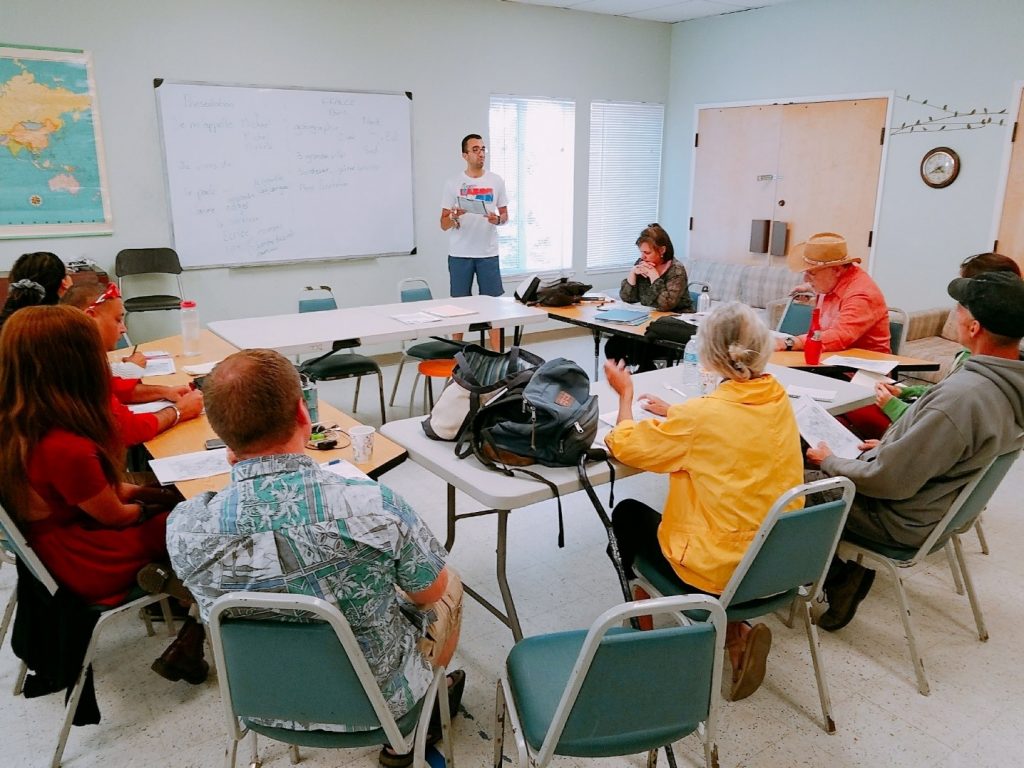
Michael Saidani, 2017-2018 Fulbright Visiting Researcher from France, volunteering and teaching French language to students at a community church in downtown Davis, California
Although most of my time as a Fulbright Visiting Researcher at the University of California, Davis (UC Davis) was dedicated to working on my research project focused on the circular economy, I have always believed that the Fulbright Program should be an exciting cultural exchange experience. During my award, I participated in some amazing outdoor activities such as hiking and traveling around the United States, particularly in California. But I’d like to share how I have been involved on my host campus and in my local community to contribute in return – no matter how small – to some of the benefits I’ve received by being a Fulbrighter in the United States.
A few weeks after my arrival at Davis, I proposed offering a French Language class to a downtown community church for adults who wanted not only to speak French, but also to learn more about French culture. As it was a beginner class, I taught my students how to introduce oneself, have a basic conversation, and about French geography. With no prior French language teaching experience, it was a great opportunity, and I received good feedback from my students, who were happy to work with an actual native French speaker.
During Fall Quarter, I volunteered as an Upcycling Intern at the UC Davis Aggie Reuse Store. Because the UC Davis campus is very green and engaged in sustainability activities, I wanted to find a way to be a part of those activities directly. Being an intern allowed me to promote reuse and upcycling on campus by demonstrating how to make new things out of old ones, an activity that aligned nicely with my PhD thesis related to the circular economy.
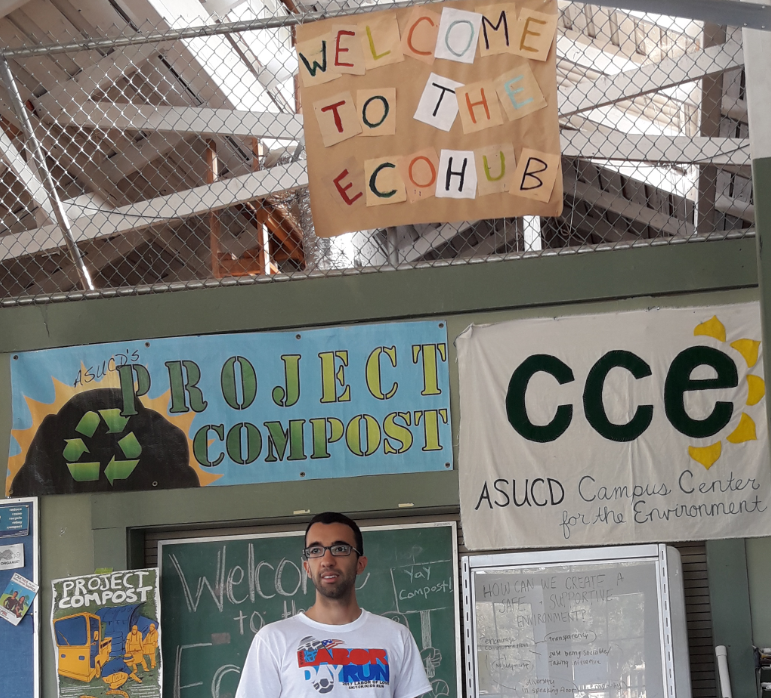
Michael Saidani, 2017-2018 Visiting Researcher to France, at the UC Davis Aggie Reuse Store
One month before returning to France, during the Fulbright Foreign Student Enrichment Seminar in St. Louis, Missouri, I engaged in a different kind of community service involving half a day of landscaping for the Great Rivers Pathways association, which is working to connect downtown St. Louis to the Gateway Arch and the Mississippi River via a new green path for pedestrians and bikers.
By sharing this small part of my Fulbright story, I would like to encourage other Fulbrighters – current and future – to embrace their entire Fulbright experience by connecting with their local host communities during their awards. By doing so, grantees can advance the Fulbright Program’s mission to meaningfully increase mutual understanding between the people of their own countries and the people of the United States.
